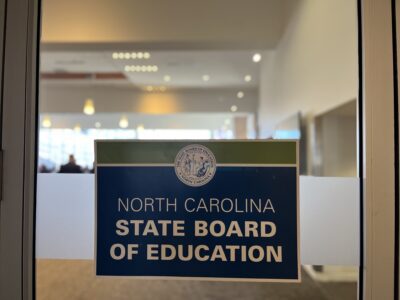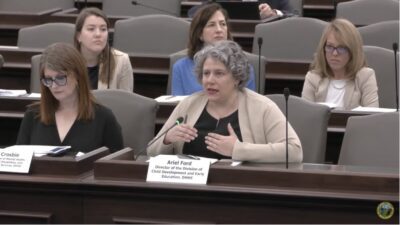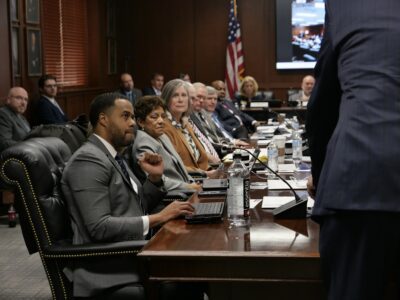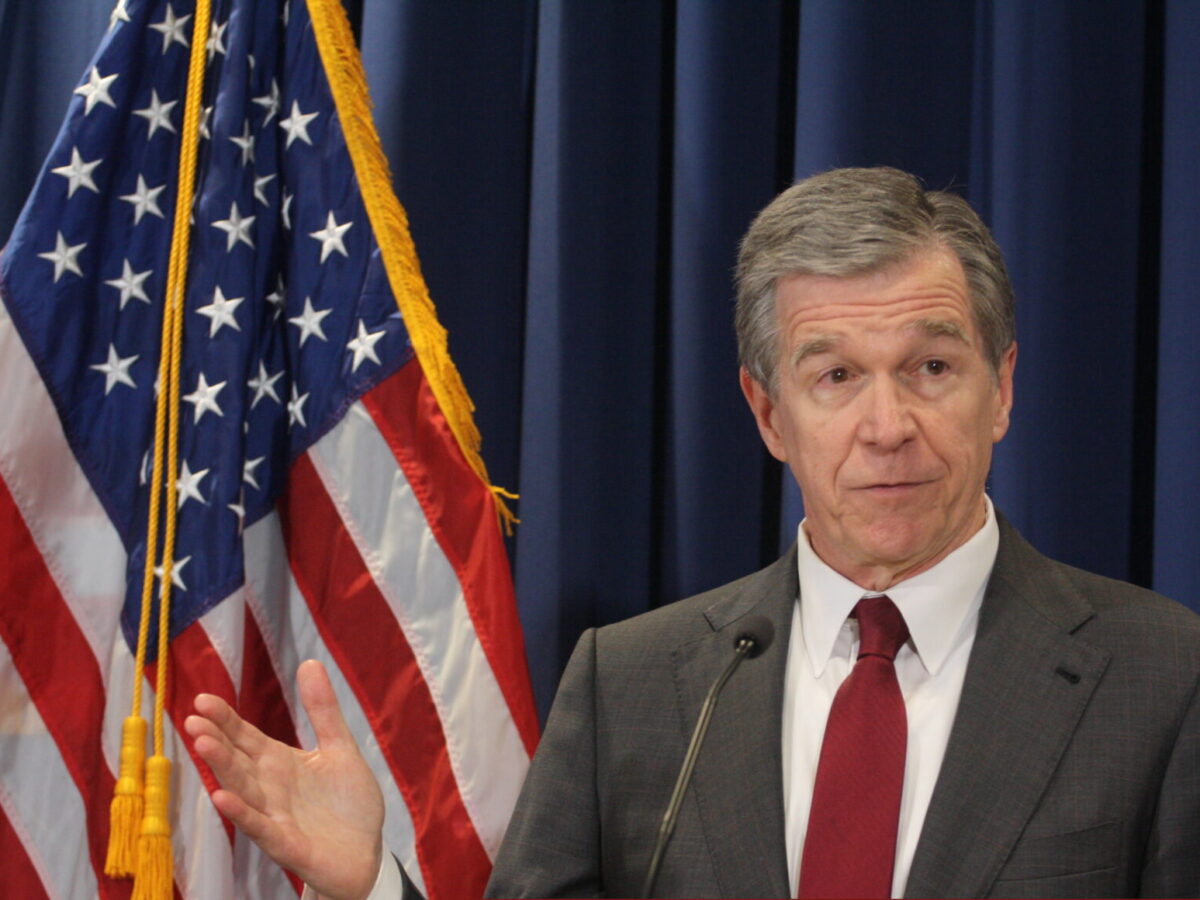
|
|
Democratic Gov. Roy Cooper presented his $34.5 billion budget proposal for Fiscal Year (FY) 2024-25 on Wednesday, calling for approximately an additional $1 billion to go toward public education — including an average 8.5% raise for teachers, a $1,500 retention bonus, and reinstatement of master’s pay.
His proposal includes a 5% raise for most state employees, which includes non-certified school employees, and most community college employees.
Cooper said his proposal presents lawmakers with a choice to invest in North Carolina’s public schools, instead of prioritizing further tax breaks and the expansion of private school vouchers.
“That’s the billion dollar choice,” Cooper said during a press conference in Raleigh. “…We have the revenue to do this — it is about priorities.”
The governor’s proposal follows his declaration of a state of emergency for public education and proclamation of 2024 as “The Year of Public Schools.”
Cooper presented his budget proposal on the first day of the “short session,” during which lawmakers can adjust the two-year budget passed last fall. Most sessions, the governor’s proposal is released first, followed by the House and Senate. At that point, the two chambers work together to pass an updated compromise budget.
There is a Republican supermajority this session, meaning Republicans will drive fiscal and policy decisions.
This year, North Carolina has a projected one-time $1.4 billion surplus in state revenues through FY 2025, according to the latest state consensus revenue forecast. This essentially means there is $1.4 billion extra state dollars that lawmakers can choose to invest during the short session.
House Speaker Tim Moore, R-Cleveland, has already told media that he would like to put $300 million more toward the Opportunity Scholarship program. The program, which funds private school vouchers at eligible schools, was expanded during the long session to all families regardless of income.
Moore also said he would like to see funding for child care subsidies, additional raises to school and state employees, and an additional $400 million toward Medicaid.
On Wednesday, Cooper said his proposal includes “a moratorium” on further expansion of public school vouchers. His proposal freezes the investment in the Opportunity Scholarship program at 2023-24 levels — adding about $174 million toward his investments in public school pay raises.
“We are at a crossroads,” he said. “One path prioritizes giveaways to the wealthy over the well-being of our state. The other secures a future of success for everyone — let’s hope we make the right choice.”
Below, you can find an overview of the education investments included in Cooper’s proposal.
Educator pay, bonuses
Cooper’s proposal includes $322.7 million to raise salaries for educators by 8.5% on average. This includes the average 3% raise most educators are slotted to receive in FY 2024-25 under the 2023 budget.
Under the proposal, a $1,000 bonus would go to all state employees. An additional $500 bonus would go to employees making less than $75,000 per year. One half of the bonus would be paid in Oct. 2024; the second half in April 2025.
The budget “lifts starting teacher salaries to more than $47,500 — the highest in the Southeast,” the proposal packet says. This number seems to include the $1,500 retention bonus the governor is proposing for most teachers.
Take a look at Cooper’s proposed teacher salary schedule for FY 2024-25, in the rightmost column.
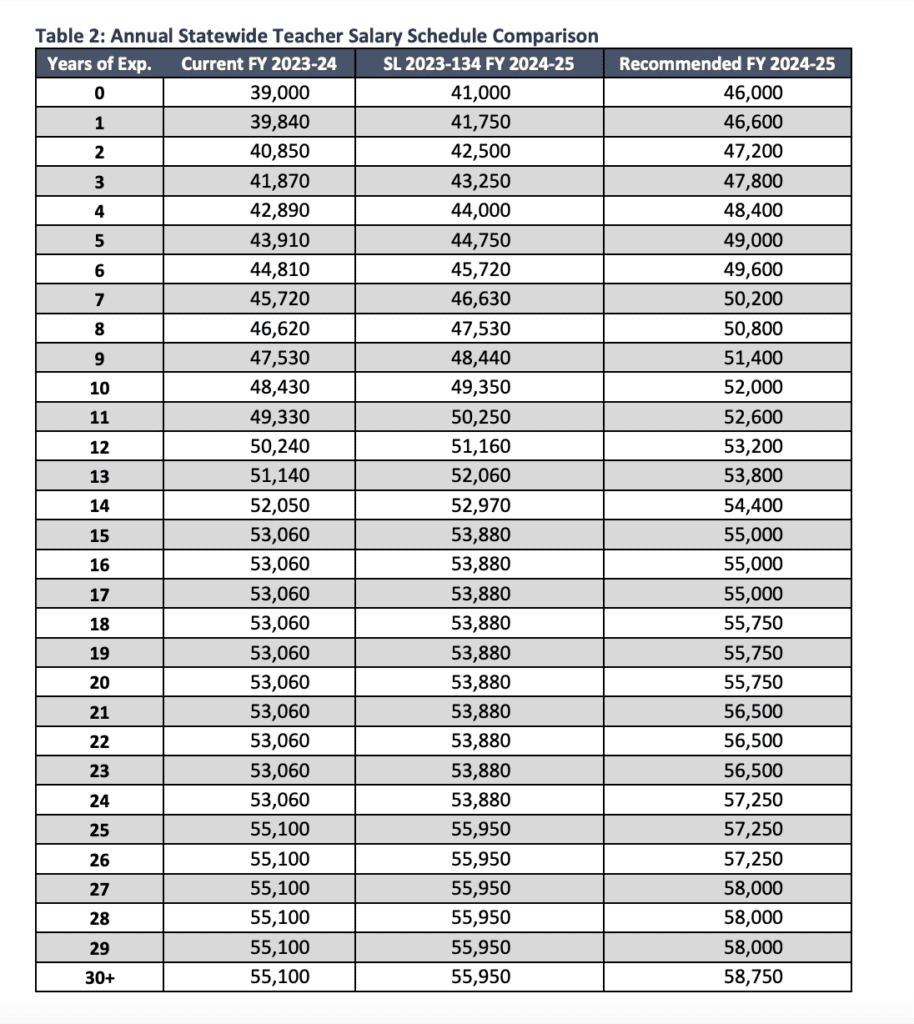
The proposal also includes $10 million to “restore 10% master’s pay supplements for over 1,000 teachers whose advanced degrees are in the subjects they teach.”
As mentioned above, the proposal includes a raise of at least 5% for all state employees, which includes non-certified school employees.
Most state employees would receive an additional 2% raise in FY 2024-25, on top of the raise approved in the 2023 budget. Employees paid on an experience-based salary schedule would receive an extra 3%.
Finally, the governor’s budget proposal includes a one-time 3% retiree supplement in FY 2024-25. The 2023 budget included a one-time 4% supplement.
Cooper’s proposal also includes:
- $25.4 million to improve recruitment and retention for school-based administrators through salary increases. The budget includes a 6% total increase for existing principals.
- $8.2 million to expand the North Carolina Principal Fellows Program “to prepare up to 300 new principals annually.”
- $1.8 million to expand the Advanced Teaching Roles program.
- $1.7 million to increase funding for district-level recruitment bonuses in small and low-wealth counties. With the allocation included in the 2023 budget, the net allocation for this item would be $6 million.
- $1.6 million in recurring funds to expand supports for pre-service and beginning teachers in becoming fully licensed.
- The proposal also increases supplemental funding for the state’s 69 eligible low-wealth counties by 13%, or $40 million.
- $900,000 to cover the cost of National Board certification fees for 470 teachers each year, with priority to educators in high-need and low-performing schools. Board certified teachers earn a 12% supplement to their annual salary.
The proposal would also invest in many initiatives to strengthen the state’s teacher pipeline. During the 2022-23 school year, 11.5% of teachers left their role — up from 7.8% of teachers who left teaching the year before.
There is $4.7 million to expand the North Carolina Teaching Fellows program to up to 490 new candidates in FY 2024-25. The budget would extend eligibility for the program to all institutions with approved educator preparation programs (EPPs) and to students in any licensure area.
The proposal includes an additional $4 million to expand the North Carolina New Teacher Support program, which focuses on supports for beginning teachers at low-performing, high-poverty schools.
Another $5 million would establish a matching grant program for “high-quality teacher preparation residency programs in high-need rural and urban districts,” to be distributed by the State Board of Education.
There is $500,000 for statewide professional development from the N.C. Center for the Advancement of Teaching (NCCAT). Another $300,000 would expand “teacher candidate recruitment programs and fund a study to improve recruitment strategies” to reduce teacher vacancy rates. That study will “include research and recommendations for a statewide system or entity to coordinate teacher recruitment and support.”
Read more on teacher attrition
Other funds for public schools, students
The governor’s proposal includes funding to hire 700 additional K-3 teacher assistants (TAs) — an increase of 11% from the current budget. The increase is funded by Education Lottery receipts.
Additionally, the proposal would fund about 575 new school health personnel, which includes school counselors, nurses, social workers, and psychologists.
The budget also proposes a $2.5 billion school construction bond, which would be voted on in November 2024. That bond could fund approximately 90 new elementary and middle schools, Cooper said during the press conference.
“Over the next five years almost 1,600 schools report needing renovation and 131 new schools need to be built,” the proposal says.
The proposal also addresses several of the Department of Public Instruction’s (DPI) legislative requests.
First, there is $35 million to expand Read to Achieve literacy programs to middle grade students.
There is also $19 million toward DPI’s efforts to support low-performing schools. DPI asked the General Assembly for $4.5 million to continue that work after federal Covid relief dollars run out in September.
State Superintendent Catherine Truitt also advocated last long session for universal school meals for students.
Cooper’s proposal does not include funding for universal school meals, but does include an additional $900,000 to “offset the co-pays for students eligible for reduced-price lunches in schools participating in the National School Lunch Program.”
“Research shows that receiving free lunch improves school attendances and decreases food insecurity and suspensions,” the proposal says.
The 2023 budget included $3 million to permanently eliminate the reduced-price lunch copay for North Carolina students and eliminate penalties for unpaid student meal debt. The governor’s proposal makes that $3.9 million for FY 2024-25.
The proposal also includes required state matching funds for the federal Summer Electronic Benefit Transfer Program for Children (Summer EBT). The program, also known as SUN Bucks, “will provide grocery-buying benefits to qualifying families to prevent child hunger during the summer months when school is out for children who rely on school meals for daily nutrition.” SUN Bucks will launch this summer.
Additionally, the proposal includes:
- $10 million to hire a Career and Postsecondary Planning Director at DPI and increase the number of school-based coordinators in sixth-12th grade.
- The elimination of the 13% funding cap for Exceptional Children (EC) students to “provide additional teachers and instructional support, instructional supplies and materials, and staff development.” The 2023 budget instructed DPI to develop a weighted funding model for EC students to remove that cap and instead fund children “on the basis of the reported cost of services provided.”
- The proposal also removes the 10.6% funding gap for students with Limited English proficiency. Under the proposal, schools for whom English learners make up more than 10.6% of their ADM would receive additional funds for “classroom teachers, textbooks, staff development, and other supports needed to help these students thrive.”
- $70 million combined in the At-Risk and Disadvantaged Student Supplemental funds to “fund teachers and instructional support positions, provide intensive in-school and after school remediation, and provide professional development for teachers serving disadvantaged students.”
- $6 million to create a pilot program to give funds to high-poverty schools “that adopt a Community Schools or other evidence-based model to address out of school barriers to learning.”
- $12.8 million to the Uniform Education Reporting System (UERS) to increase statewide student reporting capacity. There is also nearly $5 million to support various cybersecurity initiatives across the state’s public schools.
The proposal also includes $400,000 to establish an equity office at DPI “to direct the recruitment and retention of a diverse educator workforce that is representative of the state’s student population.”
This comes after the UNC Board of Governor’s Committee on University Governance recently voted unanimously and without discussion to repeal and replace the UNC System’s current diversity, equity, and inclusion (DEI) policy.
There is also $453,000 to fund positions to support DPI’s central financial infrastructure. Recent financial challenges and budget shortfalls among North Carolina school districts have highlighted the importance of chief financial officers and sound financial systems.
Early child care
Federal funds stabilizing child care run out at the end of June. In response, child care advocates are asking state legislators for a one-time $300 million allocation to avoid closures and price increases for parents.
Advocates asked the General Assembly for the same amount last year without success.
The governor’s proposal includes $200 million for stabilization grants.
“Access to affordable child care for parents, businesses, and educators is one of the most immediate threats to sustaining our momentum,” the proposal’s introduction says. “Nearly one-third of North Carolina child care centers are at risk of closure and only 26% of parents can afford child care costs.”
There is also $129 million for child care subsidies to increase reimbursement rates for providers in rural and low-wealth communities, which the proposal says will “secure child care for approximately 50,000 children per year by creating a statewide rate floor starting in July 2024.”
“These funds will allow about 3,500 child care sites in over 75% of NC counties to see an increase in their subsidy rate,” the proposal says.
The proposal also includes $197 million to expand access to NC Pre-K, the state’s preschool program for eligible 4-year-olds. The program currently reaches about half of eligible 4-year-olds, or 30,000 children.
There is also $24 million to provide “wrap-around summer care and learning programs for students once they complete NC Pre-K and before they enter kindergarten.”
As EdNC has previously reported, child care teachers make some of the lowest wages of any industry.
The governor’s proposal would create a grant program to help child care teachers afford care for their own children. The $25 million program would provide “free or reduced cost care for the children of roughly 2,200 child care providers,” the proposal says.
There is also $26 million to provide educational attainment-based salary supplements, through expansion of the state’s Child Care WAGE$ program.
The budget also adds a fourth region to the state’s Tri-Share Child Care pilot program. That model splits the cost of child care between participating businesses, eligible employees, and the state government.
The governor’s proposal also includes:
- $50 million toward start-up and capital grants for NC Pre-K and child care centers. There is also $10 million to expand Smart Start, which serves young children and families across the state.
- $24 million to create a pilot program “to incentivize the business community to contribute to employee dependent care flexible spending accounts.”
- $1.2 million to implement recruitment strategies and professional development for child care teachers.
- The provision of a refundable child and dependent care tax credit.
Finally, the budget allocates $100,000 to the North Carolina Community College System (NCCCS) to “evaluate the effectiveness of the Child Care Grant Program, which was appropriated $1.2 million in recurring funds” in the 2023 budget.
The program, which has been in place since 1993, provides grants to community college students to use for child care while they are in school. The program needs more funding and wider eligibility, local administrators of the grants told EdNC in June.
“The evaluation will assess the program’s effectiveness and propose adjustments that would support more North Carolina parents seeking community college education,” the governor’s proposal says.
Community colleges
During the press conference, Cooper said his proposal includes “significant funding for community colleges.”
There is about $28.5 million to give 5% across-the-board raises to most state-funded community college employees in FY 2024-25. Another $28.5 million goes toward the Enhanced Labor Market Adjustment Reserve, to give the system “flexibility to address specific challenges for hard-to-retain and fill roles.”
State-funded community college employees would receive the same retention bonus as state employees and educators, up to $1,500. Community college retirees would also receive the same one-time 3% supplement.
On top of the retention bonus, Cooper’s proposal includes $3.1 million to give “a 10% per course bonus for full-time and adjunct instructors who teach courses inside correctional facilities.”
“Community colleges play a key role in education for incarcerated individuals. Obtaining an associate’s degree significantly reduces recidivism rates,” the proposal says. “Currently, over 75 community college courses are offered in prisons across the state.”
This year, the NCCCS’ primary legislative request is funding for Propel NC, the system’s new funding model proposal. The request includes a nearly $100 million price tag for FY 2024-25.
Propel NC would shift the current full-time equivalent (FTE) funding tiers to “workforce sectors,” with courses ranked and valued by statewide salary job demand data. The NCCCS says this will move the system toward a labor-market driven model of community college programs. The anticipated cost of this component of the model is approximately $68.6 million, according to the system.
The governor’s budget includes $34.3 million to implement Propel NC.
“This new funding model will help streamline degree attainment and prepare a well-trained workforce to meet the demands of the State’s growing economy,” the proposal says.
Propel NC also includes a request of $6 million to increase the enrollment increase reserve across the system. Per the system’s proposal, those nonrecurring funds would go toward a fixed per-FTE amount for any colleges that go over the enrollment threshold set by their FTE for the fiscal year.
Cooper’s proposal allocates $3 million to establish that reserve.
The governor’s proposal did not including funding for the last component of Propel NC with a price tag — $24.4 million to increase the base allocation for colleges.
The proposal did include a $25 million enrollment growth adjustment for FY 2024-25, “based on the increase in community college enrollment. Community college enrollment increased by 4.6%, or 10,435 full-time equivalent students.”
The governor’s proposal also includes a number of investments in the workforce, funding many projects through the NCCCS.
The budget proposal includes $40 million to complete construction of Central Carolina Community College’s Moore Center, which “will be used as a shared training center by Advance NC to train staff for new and expanding employers in the electric vehicle manufacturing supply chain, semiconductors, and life sciences.”
There is $4 million for the NCCCS to create a competitive grant fund for community colleges with electric vehicle workforce programs.
Finally, there is also $133,000 for ApprenticeshipNC to establish a “whole system model” of apprenticeships with the DPI and the Department of Commerce.
“We recognize (community colleges) as a core anchor to economic improvement,” Cooper said.
The budget also includes $3.25 million in nonrecurring funds to establish a rural youth apprenticeship program across five regions, to be distributed by the Department of Commerce. After two years, the funding of successful programs will depend on local funding sources.
The proposal packet says the program is modeled on “the successful Surry-Yadkin Works model developed by Surry and Yadkin counties.” That model is a work-based learning program created in 2021 to connect high school students in Surry and Yadkin counties with internship and pre-apprenticeship opportunities in local high-demand fields.
You can read the governor’s full proposal here.



